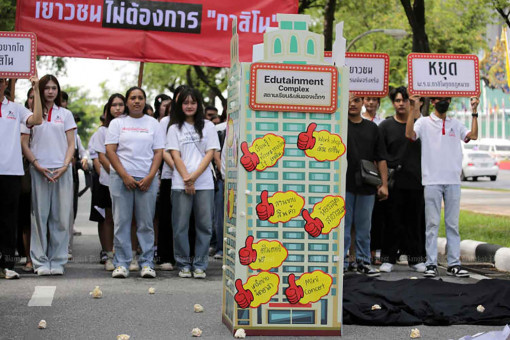Talks with coalition partners flagged

The Finance Ministry is prepared to pursue talks with government coalition partners to advance a casino-entertainment complex project which is part of the Pheu Thai-led government’s policy statement, says Deputy Finance Minister Julapun Amornvivat.
Mr Julapun said the ministry is in no rush to push ahead as flood recovery in the North is a bigger priority. However, it will hold talks with the coalition parties to ensure they are on the same page before proceeding.
He said the bill to allow casinos to operate legally within entertainment complexes has received positive feedback during the public hearing process required by Section 77 of the constitution. The bill will be submitted to cabinet later this year, he said, adding the Pheu Thai Party has not set any expectations or goals, and the project will take months to materialise.
“For the project to move forward the details must be debated by all stakeholders. The bill will be examined in line with the legislative process. The final version may not be the same as the original as the [scrutiny] committee will come from diverse backgrounds,” he said.
Mr Julapan said the government has not designated any specific province or area for the complexes. A committee will select suitable locations in various regions that are part of the tourism promotion strategy.
An independent agency will conduct a feasibility study, considering aspects such as job creation opportunities and potential impacts on local communities.
Under the Finance Ministry-sponsored bill, a policy board will be set up and chaired by the prime minister. It will set the rules governing gaming complexes.
The bill requires a complex to acquire a licence to operate, which would be valid for up to 30 years.
An operator must also pay 5 billion baht to register, plus an annual payment of 1 billion baht. Each complex will be assessed every five years. After 30 years, the licence can be renewed for another 10 years.
Five venues are seen as potential hosts: two in Bangkok and one each in the Eastern Economic Corridor, Chiang Mai and Phuket. Six major businesses have expressed interest in investing in the project.
Bhumjaithai leader Anutin Charnvirakul said the casino-entertainment scheme should be discussed by coalition partners before its submission to the cabinet. In August, Bhumjaithai secretary-general Chaichanok Chidchob expressed scepticism the bill would solve illegal gambling problems and noted it also failed to spell out exactly how Thai workers could secure jobs.
Meanwhile, Prime Minister Paetongtarn Shinawatra will on Monday hold talks with business leaders at Government House to discuss measures to boost the economy, said Jirayu Houngsab, an adviser to the prime minister.
Among them are Sanan Angubolkul, chairman of the Thai Chamber of Commerce; Kriangkrai Tiannukul, president of The Federation of Thai Industries (FTI); Payong Srivanich, chairman of the Thai Bankers’ Association (TBA); and Sutee Satanasathaporn, director of the office of the Joint Standing Committee on Commerce, Industry and Banking (JSCCIB).
Mr Jirayu said the JSCCIB has prepared a proposal to help drive the economy and enhance competitiveness. The proposal will also outline assistance for small and medium-sized businesses and water resource management, he added.
Narit Therdsteerasukdi, secretary-general of the Board of Investment (BoI), said the prime minister, who chairs the National Electric Vehicle Policy Committee, is keen on supporting industry and achieving the Zero Emission Vehicle (ZEV) programme.

Julapun: Bill could change

